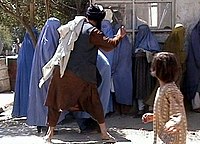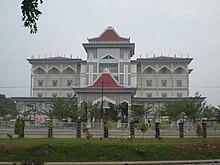
Back Sjaria Afrikaans Scharia ALS الشريعة الإسلامية Arabic شريعه اسلاميه ARZ শ্বৰীয়ত Assamese Xaria AST ШаригӀат AV Şəriət Azerbaijani Шәриғәт Bashkir Шарыят Byelorussian

Sharia rationi iudiciali abest. Sharia ad personales Mussulmanorum leges adhibetur. Sharia omnino adhibetur, legibus scelestibus non exclusis. Variationes regionales in adhibitione shariae.
Sharia vel lex sharia (Arabice شريعة, IPA |ʃaˈriːʕa|), est prima ratio legitima Islamica, a religiosis praeceptis Islamicis derivata, praecipue Alcorano et Hadith. Vocabulum sharia a sharīʿah, verbo Arabico, deducitur, quod significat corpus legum moralium et religiosarum, ex prophetia deductarum, contra leges hominum.[1][2] [3]
Sharia multas res tractat, inter quas scelus, civilitas, et oeconomica, ac res personales sicut coitus, sanitatis cura, diaeta, preces, regimen morum, et ieiunium. Adhaesus ad shariam diutissime in historia una fuit ex proprietatibus fidei Islamicae.[4] Per definitionem severissimam et historice cohaerentem, sharia in Islam habetur Dei lex, quae errare non potest.[5]
Sunt duo primarii shariae fontes: Alcoranum et Hadith, sententiae et vivum Mahometi exemplum.[6] Ad res in his fontibus non recte pertinentes disputatas, sharia per varios modos inter varias sectas Islamicas (Sunniticam et Shiam), et inter varias scholas iurisprudentiae, sicut Hanafi, Maliki, Shafi'i, Hanbali, et Jafari derivatur.[7] Sharia in his scholis per hierarchicam derivatur, per unam vel plures harum rationum: Ijma (plerumque consensus comitum Mahometi), Qiyas (analogia ex fontibus primariis derivata), Istihsan (sententia quae Islam secundum iudices Islamicos adiuvat), et Urf (mores).




Sharia est fons legum magni momenti in variis civitatibus Islamicis. Nonnullae adhibent omnem vel plurimam partem codicis sharia, et inter has sunt Arabia Saudiana, Sudania, Irania, Iraquia, Afghanistania, Pakistania, Bruneium, Emiratus Arabici Coniuncti, Qatar, Yemenia, et Mauritania. In his civitatibus, homines poenas a sharia mandatas, sicut decollatio, verberatio, et lapidatio, iam emetiuntur, aut secundum aut praeter leges.[8] Introductio et constitutio shariae est diuturnus motuum Islamisticorum finis per orbem terrarum, etiam in civitatibus Occidentalibus, sed conatus ad shariam imponendam duxerunt ad controversiam,[9] violentiam[10] et etiam bellum.[11]
Plurimae civitates shariam rite non agnoscunt; nonnullae autem in Asia, Africa, et Europa partes shariae agnoscunt et accipiunt inter leges de divortio, hereditate, et aliis rebus personalibus, sed solum inter cives Islamicos.[12][13][14] In Britannia, Tribunal Arbitrii Islamicum lege familiarum in sharia utitur ad altercationes statuendas, et haec circumscripta shariae acceptio est controversiosa.[15]
Sententia sceleris, ratio iudicialis, iustitia, et punitio in sharia adiecta a punitione legum saecularium variat.[16][17] Variationes shariae et legum saecularium ad controversiam duxerunt num sharia cum saecularibus rectionis formis, iuribus humanis, libertate sentiendi, et iuribus mulierum congruere possit.[18]
Nexus interni
- ↑ R. M. Ritter, ed., New Oxford Dictionary for Writers and Editors: The Essential A-Z Guide to the Written Word (Oxoniae: Oxford University Press, 2005), 349.
- ↑ Calder et Hooker 2007.
- ↑ Rehman 2007.
- ↑ DeLong-Bas 2004:93.
- ↑ Coulson 2011.
- ↑ Esposito 2001.
- ↑ Esposito 1999.
- ↑ Otto 2010.
- ↑ Hamann, Katie (29 Decembris 2009). "Aceh's Sharia Law Still Controversial in Indonesia". Voice of America.
- Iijima, Masako (13 Ianuarii 2010). "Islamic Police Tighten Grip on Indonesia's Aceh". Reuters.
- "Aceh Sharia Police Loved and Hated," The Jakarta Post.
- ↑ BBC News, 3 Ianuarii 2003: "Analysis: Nigeria's Sharia Split": "Thousands of people have been killed in fighting between Christians and Muslims following the introduction of sharia punishments in northern Nigerian states over the past three years."
- Harnischfeger, Johannes (2008).
p. 16. "When the Governor of Kaduna announced the introduction of Sharia, although non-Muslims form almost half of the population, violence erupted, leaving more than 1,000 people dead."
p. 189. "When a violent confrontation loomed in February 200, because the strong Christian minority in Kaduna was unwilling to accept the proposed sharia law, the sultan and his delegation of 18 emirs went to see the governor and insisted on the passage of the bill." - Mshelizza, Ibrahim, 28 Iulii 2009: "Fight for Sharia Leaves Dozens Dead in Nigeria – Islamic Militants Resisting Western Education Extend Their Campaign of Violence," The Independent.
- PBS, "Nigeria in Transition: Recent Religious Tensions and Violence."
- Al Jazeera English, 28 Decembris 2010: "Timeline: Tensions in Nigeria: A Look at the Country's Bouts of Inter-Religious and Ethnic Clashes and Terror Attacks": "Thousands of people are killed in northern Nigeria as non-Muslims opposed to the introduction of sharia, or Islamic law, fight Muslims who demand its implementation in the northern state of Kaduna."
- Roza Ibrahimova, 27 Iulii 2009: "Dozens Killed in Violence in Northern Nigeria" (pellicula [Adobe Flash requirit; 00:01:49]). Al Jazeera English: "The group Boko Haram, which wants to impose sharia (Islamic law) across the country, has attacked police stations and churches."
- Harnischfeger, Johannes (2008).
- ↑ [1]. Library of Congress Country Studies: Sudan: "The factors that provoked the military coup, primarily the closely intertwined issues of Islamic law and of the civil war in the south, remained unresolved in 1991. The September 1983 implementation of the sharia throughout the country had been controversial and provoked widespread resistance in the predominantly non-Muslim south . . . Opposition to the sharia, especially to the application of hudud (sing., hadd), or Islamic penalties, such as the public amputation of hands for theft, was not confined to the south and had been a principal factor leading to the popular uprising of April 1985 that overthrew the government of Jaafar an Nimeiri."
- Marchal, R. (2013), Islamic political dynamics in the Somali civil war. In Islam in Africa South of the Sahara: Essays in Gender Relations and Political Reform, 331-352.
- "PBS Frontline: "Civil war was sparked in 1983 when the military regime tried to impose sharia law as part of its overall policy to "Islamicize" all of Sudan."". Pbs.org
- "The shari'a was imposed on non-Muslim Sudanese peoples in September 1983, and since that time Muslims in the north have been fighting a jihad against the non-Muslims in the south" (Tibi 2008:33).
- ↑ Otto 2008.
- ↑ Stahnke et Blitt 2005.
- ↑ Etiam vide "Sharia Law profile by Country," Emory University (2011).
- ↑ Bowen 2009; Corbin 2013; Taher 2008.
- ↑ Encyclopædia Britannica; vide commentarium de Shari'ah (Islamic law), 2006.
- ↑ Otto 2008.
- ↑ Al-Suwaidi 1995.